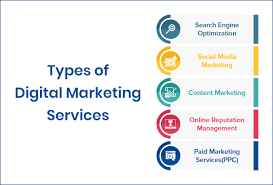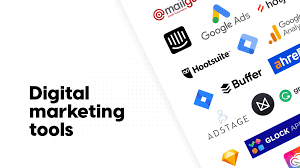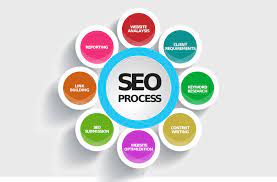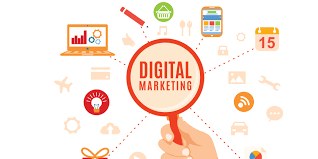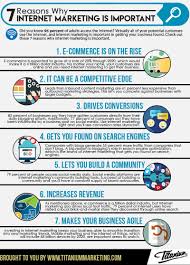The Importance of Digital Brand Management in Today’s Business Landscape
In the digital age, where online presence plays a crucial role in shaping consumer perceptions, effective digital brand management has become more important than ever for businesses. Digital brand management encompasses the strategies and techniques used to build, maintain, and enhance a brand’s reputation in the online world.
Building a Strong Online Presence
With the proliferation of social media platforms, websites, and online marketing channels, businesses have numerous opportunities to connect with their target audience. Digital brand management involves creating a consistent and compelling brand identity across all digital touchpoints to leave a lasting impression on consumers.
Maintaining Brand Consistency
Consistency is key in digital brand management. From the design elements used on a website to the tone of voice in social media posts, maintaining a cohesive brand image helps reinforce brand recognition and trust among consumers. By ensuring that all digital assets align with the brand’s values and messaging, businesses can strengthen their position in the market.
Engaging with Customers
One of the primary goals of digital brand management is to engage with customers effectively. Through social media interactions, email marketing campaigns, and other online communication channels, businesses can build relationships with their audience, gather feedback, and address any concerns promptly. By listening to customer feedback and responding thoughtfully, brands can demonstrate their commitment to customer satisfaction.
Monitoring Online Reputation
In today’s hyper-connected world, managing an online reputation is essential for businesses. Digital brand management involves monitoring mentions of the brand across various online platforms and addressing any negative feedback or reviews promptly. By proactively managing their online reputation, businesses can safeguard their brand image and mitigate potential damage from negative publicity.
Adapting to Changing Trends
The digital landscape is constantly evolving, with new technologies and trends emerging regularly. Effective digital brand management requires businesses to stay informed about industry developments and adapt their strategies accordingly. By staying agile and embracing innovation, brands can remain relevant and competitive in an ever-changing market.
In conclusion, digital brand management is a critical aspect of modern business strategy. By investing time and resources into building a strong online presence, maintaining consistency across all digital touchpoints, engaging with customers effectively, monitoring their online reputation, and adapting to changing trends, businesses can strengthen their brand image and drive long-term success in the digital era.
Essential Tips for Effective Digital Brand Management
- Consistently monitor your brand’s online presence.
- Engage with your audience on social media platforms.
- Maintain a cohesive brand image across all digital channels.
- Utilise analytics to track and measure the performance of your digital efforts.
- Respond promptly to customer feedback and queries online.
- Create valuable and relevant content to attract and retain customers.
- Collaborate with influencers or partners to extend your brand reach.
- Stay updated on industry trends and adapt your strategies accordingly.
- Protect your brand reputation by addressing any negative publicity swiftly.
Consistently monitor your brand’s online presence.
To effectively manage your digital brand, it is crucial to consistently monitor your brand’s online presence. By regularly tracking mentions, reviews, and conversations about your brand across various online platforms, you can stay informed about how your brand is perceived by customers and address any issues or opportunities promptly. Monitoring your online presence allows you to maintain brand consistency, respond to feedback in a timely manner, and proactively manage your brand’s reputation in the digital landscape. This proactive approach not only helps strengthen customer relationships but also enables you to make data-driven decisions to enhance your brand’s online visibility and credibility.
Engage with your audience on social media platforms.
To enhance your digital brand management strategy, it is crucial to actively engage with your audience on social media platforms. By fostering meaningful interactions, responding to comments and messages, and sharing relevant content, you can build a loyal community of followers who feel connected to your brand. Engaging with your audience on social media not only strengthens brand loyalty but also allows you to gather valuable feedback, insights, and sentiments that can inform your marketing decisions and help shape a positive brand image online.
Maintain a cohesive brand image across all digital channels.
To ensure a strong and recognisable brand presence online, it is crucial to maintain a cohesive brand image across all digital channels. Consistency in design elements, messaging, and tone of voice helps reinforce brand identity and build trust with consumers. By presenting a unified brand image across websites, social media platforms, email campaigns, and other digital touchpoints, businesses can create a seamless and memorable experience for their audience, ultimately strengthening their position in the competitive digital landscape.
Utilise analytics to track and measure the performance of your digital efforts.
To enhance your digital brand management strategy, it is essential to utilise analytics tools to track and measure the performance of your digital efforts. By analysing key metrics such as website traffic, social media engagement, conversion rates, and customer behaviour, you can gain valuable insights into the effectiveness of your online activities. This data-driven approach allows you to identify trends, assess the impact of your campaigns, and make informed decisions to optimise your digital brand presence for maximum impact and success.
Respond promptly to customer feedback and queries online.
In the realm of digital brand management, it is crucial to respond promptly to customer feedback and queries online. By acknowledging and addressing customer concerns in a timely manner, businesses demonstrate their commitment to customer satisfaction and build trust with their audience. Prompt responses show that the brand values its customers’ opinions and is dedicated to providing excellent service, ultimately enhancing the overall reputation and credibility of the brand in the digital space.
Create valuable and relevant content to attract and retain customers.
Creating valuable and relevant content is a cornerstone of effective digital brand management. By offering content that resonates with your target audience, you can attract their attention, build trust, and ultimately retain their loyalty. Whether it’s informative blog posts, engaging social media updates, or helpful resources, providing content that adds value to your customers’ lives not only enhances your brand’s credibility but also establishes a meaningful connection that encourages long-term engagement. In today’s competitive digital landscape, delivering quality content is key to standing out and fostering lasting relationships with your audience.
Collaborate with influencers or partners to extend your brand reach.
Collaborating with influencers or partners is a powerful strategy in digital brand management to extend your brand reach and connect with a wider audience. By leveraging the existing following and credibility of influencers or strategic partners, businesses can increase brand visibility, build trust with consumers, and drive engagement. Partnering with individuals or organisations that align with your brand values can help you tap into new markets and reach potential customers who may not have been exposed to your brand otherwise. This collaborative approach not only expands your reach but also enhances brand authenticity and relevance in the eyes of consumers.
Stay updated on industry trends and adapt your strategies accordingly.
To excel in digital brand management, it is crucial to stay abreast of industry trends and adjust strategies accordingly. By keeping a finger on the pulse of the rapidly evolving digital landscape, businesses can proactively respond to changing consumer behaviours, emerging technologies, and competitive dynamics. Adapting strategies in line with industry trends not only ensures relevance and competitiveness but also positions brands as forward-thinking and innovative in the eyes of their target audience. Embracing change and staying agile are key components of successful digital brand management in today’s dynamic business environment.
Protect your brand reputation by addressing any negative publicity swiftly.
To safeguard your brand reputation in the digital realm, it is crucial to address any negative publicity promptly and effectively. By responding swiftly to criticism or unfavourable reviews, businesses can demonstrate their commitment to customer satisfaction and show that they value feedback. Taking proactive steps to resolve issues and communicate openly with customers can help mitigate the impact of negative publicity and preserve the trust and loyalty of your audience. Consistency in addressing concerns and maintaining transparency in your interactions can go a long way in protecting your brand’s reputation online.


